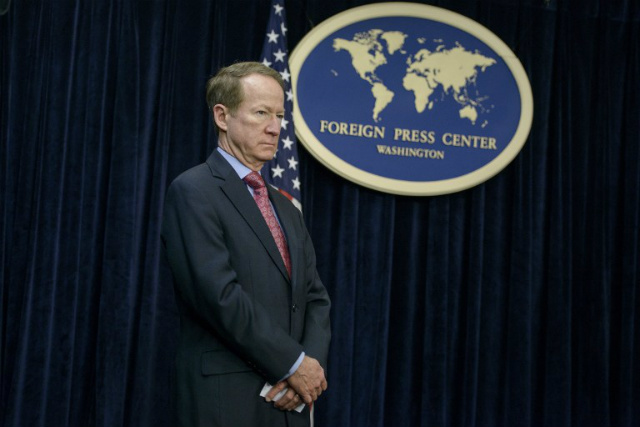These funds 'will be used in strict compliance with US legal obligations, and basic international law enforcement and policing standards,' a US official tells Rappler

TOP OFFICIAL. US Assistant Secretary of State William Brownfield listens during a briefing at the Foreign Press Center on February 24, 2015, in Washington, DC. Photo by Brendan Smialowski/AFP
The United States this week committed around P320 million ($6.7 million) to boost law enforcement in the Philippines, an official of the US State Department told Rappler.
William Brownfield, assistant secretary for international narcotics and law enforcement affairs of the US State Department, said he approved this contribution "for the support of rule of law and law enforcement."
Brownfield said the US sent the Philippines a diplomatic note about this new commitment earlier this week.
The exact amount involved is P323.304 million ($6.725 million), according to the US State Department’s Bureau of International Narcotics and Law Enforcement Affairs (INL).
Speaking to Rappler through a phone call from the US, Brownfield said he hopes to spend this money on programs to:
- Strengthen the rule of law in the Philippines
- Provide greater due process in the country's justice system
- Improve the country’s maritime security
"Wherever the funds eventually go, these will be used in strict compliance with US legal obligations, and basic international law enforcement and policing standards," Brownfield explained.
Brownfield once served as US ambassador to Colombia, which is known for a decades-long war on drugs. Before this, he was US ambassador to Venezuela and Chile.
He is married to former US ambassador to the Philippines Kristie Kenney, who is now counselor of the US State Department.
Brownfield approved this new contribution as the Duterte administration faces two major law enforcement issues:
- Philippine President Rodrigo Duterte's war on drugs, which has killed more than 3,330 people
- The dispute between the Philippines and China over the West Philippine Sea (South China Sea)
Human rights abuses barred
On the US' P323.304-million contribution, Brownfield said: "The funding is now available for programs and support in the Philippines. 'Available' means the two governments can now discuss and reach agreement on where and how it would be spent."
When is the soonest that the Philippines can get hold of this funding?
It depends, for one, on "where we agree to put the funding," he said.
If the funds will be used to improve courts or to boost maritime security, the funding "could move fairly swiftly, and we could find that by the end of this year, these programs are actually operational."
He said that this is because "no one would criticize efforts to improve due process and access to justice in the Philippines."
Brownfield said, too, that "there are no accusations that maritime security and maritime law enforcement are producing any abuses."
"On the other hand, if we move into more complicated areas, it could take a very long time, because we obviously have to ensure that the government of the Philippines is comfortable with the program," the US official said.
"Obviously, any program in the Philippines eventually must be decided by the government of the Philippines, but I also have to be assured that the program would not put us in violation of US law. And if the program is in any sensitive area, this could take a good period of time," he added.
In his case as US Assistant Secretary of State, Brownfield said US law prohibits him "from providing assistance to any individual or any unit – security force, police, or military – that has engaged in human rights abuses."
'Rigorous vetting'
The US earlier said it is ready to give the Philippines around P1.54 billion ($32 million) for law enforcement training and services.
The INL Bureau of the US State Department said that P224.46 million ($4.665 million) of this larger amount "is set to be transferred soon, via an Interagency Agreement, from INL to the US Coast Guard."
This funding aims "to support maritime security in the Philippines."
"There is additional money which was previously appropriated by Congress for use in the Philippines, but no decisions have to be made on that funding's use until next year," a spokesperson for the INL Bureau said.
Duterte earlier said the US' pledge of $32 million for law enforcement was a way of making amends with the Philippines.
The US reacted by saying that this "is not new funding, but rather cumulative funding previously appropriated."
The US said this funding is subject to "rigorous vetting" as in the case of other forms of security assistance. The US said all of its security assistance, in turn, "promotes human rights."
Duterte, however, has chastised the US over human rights.
On a planned meeting with US President Barack Obama, which was later aborted, Duterte said that "nobody has the right to lecture" him on human rights.
Duterte said he will "answer" Obama if the US president explains America's deadly pacification of Muslims in the southern Philippines at the start of the 20th century.

No comments:
Post a Comment
Note: Only a member of this blog may post a comment.